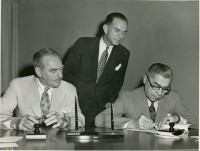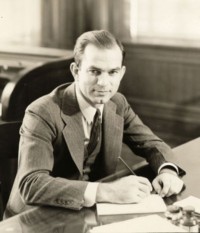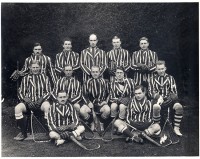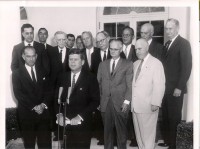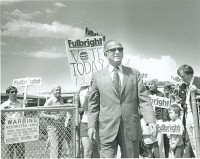THE FULBRIGHT LEGACY: The J. William Fulbright Papers and Related Collections
The name “Fulbright is associated with international exchange throughout the world. J. William Fulbright, the individual for whom the Fulbright programs were named, lived a rich and productive life that extended well beyond the establishment of the well-respected namesake programs.
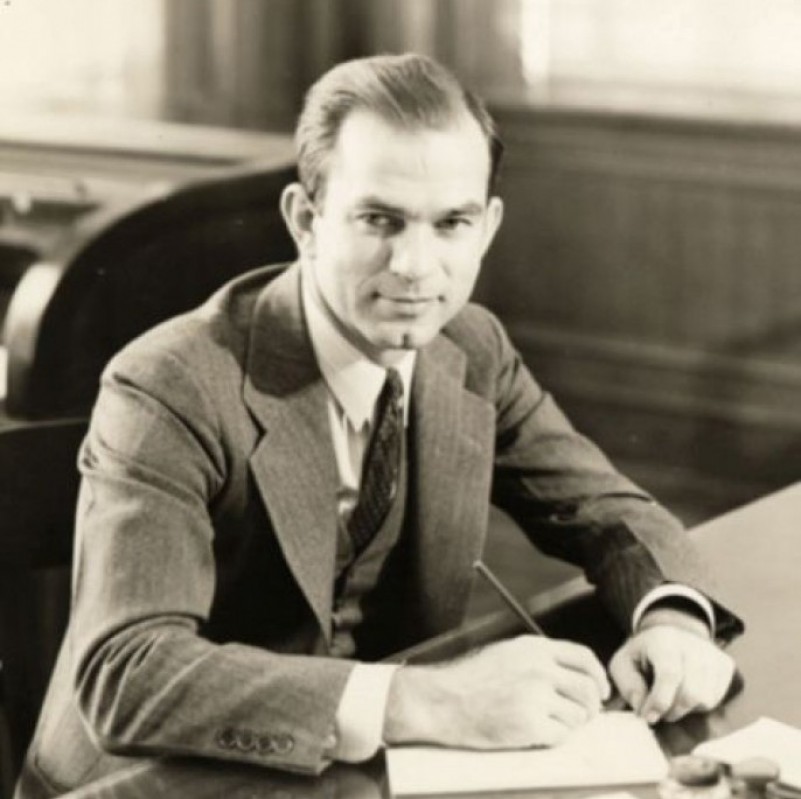
The name “Fulbright is associated with international exchange throughout the world. J. William Fulbright, the individual for whom the Fulbright programs were named, lived a rich and productive life that extended well beyond the establishment of the well-respected namesake programs. The University of Arkansas Libraries Special Collections is proud to be the reprosity of the J. W. William Fulbright Papers, which are accessed by researchers physically and electronically from all over the globe every year. In addition, several related manuscript collections provide additional primary source documentation to individuals interested in international exchange, Fulbright and related topics. These include:
- Bureau of Educational and Cultural Affairs Historical Collection
- Council for International Exchange of Scholarly Records
- NAFSA: Association of International Educators Records
The papers of J. William Fulbright reflect his personal and professional history. They include more than 1,400 linear feet of correspondence, speeches, legislative bills, photographs, and other records pertaining to the governmental, political, and diplomatic issues with which he was concerned. The papers document his thirty-two-year public career in the U.S. House and Senate, highlighting his tenure as chairman of the Foreign Relations Committee for the years 1959-1975.
The J. William Fulbright Papers contain a wealth of information of potential use to researchers of many types. J. W. Fulbright was a leader during important episodes in mid-twentieth century history. Portions of his collection relate to United States foreign relations and events such as the Cuban missile crisis, the Bay of Pigs invasion, U.S. intervention in the Dominican Republic, and the Vietnam War. Other materials relate to the senator’s major legislative interests and accomplishments and to his speechmaking in the Senate and elsewhere. The collection provides information about the Democratic Party issues in Arkansas. The papers include materials on the Fulbright resolution of 1943 favoring U.S. participation in a postwar international peace-keeping organization; the origin and administration of the Fulbright program; the censure of Senator Joseph R. McCarthy; the Fulbright memorandum of 1961 on educational and propaganda activities of the military; and U.S. policies toward the Middle East and the former Soviet Union.
University of Arkansas Libraries Special Collections preserves and provides access to rare and unique materials. With this exhibit we invite you to take a glimpse at the life and influence of one of Arkansas’s most prominent citizens. J. William Fulbright. Additional resources are available in the J. William Fulbright Papers and related collections.
J. William Fulbright moved to Arkansas as a toddler. His family quickly became established in Fayetteville, AR. His mother, Roberta Fulbright, was a formidable businesswoman who wielded considerable political power in the region in addition to being a powerful force in her sons’ life.
Young Bill Fulbright was very familiar with the campus when he started as a freshman at the University of Arkansas. He had attended the University Training School on campus from 1st through 12th grades. Fulbright earned a B.A. in Political Science in 1925. After working for the U.S. Department of Justice in Washington, Fulbright returned to Arkansas, in 1936, to teach at the University of Arkansas School of Law. He served as President of the University from1939-1941.
Fulbright represented Arkansas as a Congressman and continued to maintain ties to his home state for the remainder of his life. His ashes are interred at his family’s family plot in Evergreen Cemetery in Fayetteville.
Fulbright was elected to the United States Senate in 1944. He served until his term ended in 1974. Fulbright’s political legacy is significant and nuanced. His involvement with foreign policy is the hallmark of his career. This includes his initiation of the Fulbright Act and his role on the Senate Foreign Relations Committee. Fulbright’s Senate career was not without controversy. While he became a supporter of civil rights later in his career, Fulbright signed the segregationist Southern Manifesto in 1956. Fulbright was the lone senator to vote against appropriations for powerful Republican Senator Joe McCarthy’s Senate Permanent Investigative Subcommittee. Fulbright was also distinguished by his vocal opposition to the Vietnam War.
The J. William Fulbright Papers are rich resources for scholars, but additional related collections allow researchers to pursue associated topics. Each of these collections contains unique records and primary source materials. The 366 linear foot Bureau of Educational and Cultural Affairs Historical Collection may be one of the most visually impressive of these collections. Photographs of performers and public figures as diverse as Buckminster Fuller, Duke Ellington, and the Amherst College Glee Club are included.
Some of the related collections are:
- Bureau of Educational and Cultural Affairs Historical Collection
- Council for International Exchange of Scholars Records
- NAFSA: Association of International Educators Records
- Fulbright Alumni Association Records
- J. William Fulbright Foreign Scholarship Board Records
(Click thumbnail image to enlarge.)
